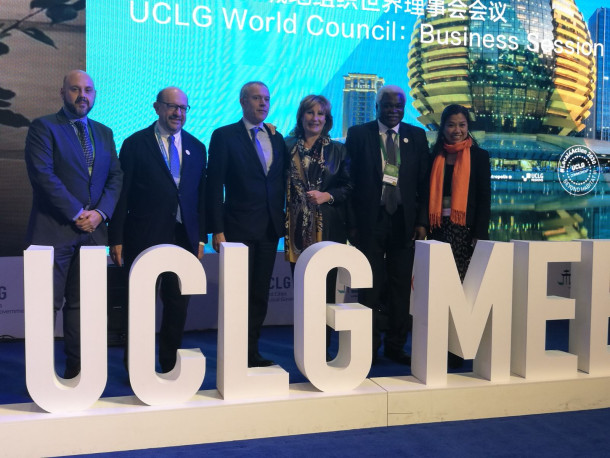 UCLG
UCLG
Metropolis attends the UCLG World Council and Forum on Smart Cities and Big Data
From 6-9 December 2017, United Cities and Local Governments (UCLG) - of which Metropolis is the metropolitan arm, held its World Council in Hangzhou, at the invitation of this member city. The World Council is the main policy body at UCLG. It adopts the organisation’s strategic lines and monitors the implementation of priorities defined by the General Assembly.
Octavi de la Varga, Secretary General, and Federica Biondi, Head of Administration and Finance at Metropolis, represented the association’s Secretariat General at this event.
The highlights of the World Council included the appointment of Emilia Saiz as new Secretary General following the retirement of Josep Roig, Secretary General from 1999 - 2011 and founding member of Metropolis. The World Council also approved the creation of the Global Women’s Caucus to ensure the inclusion of female perspectives in political deliberations, and adopted a motion on the status of Jerusalem, the Hangzhou Declaration on International Anti-Corruption Day, in addition to a Statement Before the One Planet Summit 2017.
UCLG also organised a Forum on Smart Cities and Big Data, four policy councils, a working session on localizing the SDGs (Sustainable Development Goals) reviewing the localization process, and held its Executive Bureau meeting.
The Forum on Smart Cities and Big Data, organised by the city of Hangzhou, aimed to explore the way in which modern cities use big data to develop smart cities. Another objective was to discuss the way in which efforts can be coordinated between governments, universities, research institutes and companies.
The four policy councils aim to strengthen political commitment to the major challenges faced by local governments across the world and focused on: “The Right to the City”, “Territorial, Multilevel Governance”, “Opportunities for All” and “Resilient Cities”.
These policy councils foresee the involvement of a considerable number of Metropolis members as political advisers. Barcelona, Montevideo and Gwangju met at “The Right to the City” council; Libreville and Rosario at the “Territorial, Multilevel Governance” council; Madrid and Mexico City attended the “Opportunities for All” council; and Guangzhou, Moscow and Quito led the debates at the “Resilient Cities” policy council.
During discussions at the “The Right to the City” policy council, Laura Pérez, President of Metropolis Women and representative of the city of Barcelona, underlined that “the right to the city, and especially the right to suitable housing, should be at the heart of city government”. Fernando Medina, Mayor of Lisbon, another Metropolis member, underlined that cities are “diverse spaces in which the consideration of inclusion and equal opportunities is crucial for development”.
A little later, during the debates on “Resilient Cities”, Li Xiaomian, Vice Chairwoman of the Standing Committee of Guangzhou Municipal People's Congress, hailed the creation of the policy council on this subject and explained to local leaders from all over the world that the creation of a community to share innovative urban practices would support cooperation between cities.
The next Bureau Executive meeting will be hosted by the city of Strasbourg from 23-26 May 2018, and the next World Congress will be held in Madrid to coincide with the World Forum on Urban Violence.

